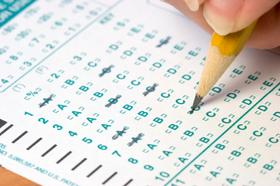When you ask your child about what he learned in school, he can probably tell you what subject he studied and rattle off some relevant facts. But when he brings home a test on the subject, you don’t see an “A” marked in red at the top of the page. Many parents do not realize that testing is not necessarily an accurate measure of your child’s intelligence or even of his ability to understand certain subject matter. Testing is a skill, and some children struggle more than others.
If your child seems perfectly intelligent and hardworking but still struggles with testing, you shouldn’t just brush it off. Testing is an important part of most school curriculums, so it will benefit your child to take action sooner than later if he struggles with testing. Keep reading to learn more about why your child might be struggling and what you can do to help him.
In this video, Hardin Coleman, Dean of the Boston University School of Education, discusses the role of standardized testing in evaluating student and school performance.
Does Your Child Struggle with Testing in School?
Your child may be bright or even gifted, but he could still be struggling in school – especially when it comes to testing. It is common for intelligent students to test poorly, but, unfortunately, they are evaluated more on their test results than their actual intelligence. The truth of the matter is that some children are better at testing than others – it is not always an accurate measure of intelligence or of the student’s understanding of the material. But what factors influence your child’s ability to perform well in a test?
According to an IQ test called the Wechsler Intelligence Scale for Children (WISC-IV), there are four primary factors that influence a student’s performance:
- Verbal Comprehension – The ability of your child to access his vocabulary and apply reasoning skills to information presented verbally is called verbal comprehension. There is actually a verbal comprehension index that can be used to measure a child’s capacity to apply word knowledge to reasoning skills. However, it is important to remember that this index can be influenced by outside factors such as the information and cultural opportunities available to the child. Poor performance in this area is typically unrelated to remembering information but may indicate poor problem-solving and reasoning skills.
- Perceptual Reasoning – This area involves various reasoning skills such as visual perception, spatial processing, and nonverbal fluid reasoning. Examples include the ability to organize and classify objects, the capacity to draw inferences from the information presented, and the ability to solve problems using perceptual reasoning skills. In simple terms, perceptual reasoning skills are those used to learn and store new information instead of recalling and using stored information at another time.
- Working Memory – The working memory is the area of the brain that students use when they are working through a problem – it stores information temporarily until the student releases it or it moves into long-term storage. The average person can store 5 to 9 pieces of information in their working memory at one time (like a 9-digit phone number). Still, when a student is deficient in working memory, he could have the ability to understand a problem but has trouble keeping the information in his mind long enough to solve the problem.
- Processing Speed – Some students take longer to process information than others. If your child has a slow processing speed, it could influence his ability to complete a test in the allotted time period because he cannot go through the material as quickly as other students. Problems with processing speed are not always related to low intelligence – your child might need some additional practice.
This video offers an overview of Wechsler Intelligence Tests.
The first two of these factors have the greatest influence on a student’s understanding of subjects such as mathematics, reading, science, and history. Students who do well in these two areas tend to perform well overall, though many exhibit higher performance in one of those two areas. It is not uncommon for students who exhibit above-average performance in these two areas to show below-average scores in working memory and processing speeds. Lower scores in these areas can deduct significantly from the student’s overall scores.
What Can You Do at Home to Improve Your Child’s Performance?
Each student is unique in terms of his individual intelligence and testing ability. To help your child improve his testing performance, you first need to identify the areas in which he struggles. For example, if your child struggles with working memory, you might help him address this issue by using support tools to remove the problem from his working memory. For a complex math problem, for example, it might help your child write the steps out instead of remembering them all at once. If your child struggles with processing speed it is not necessarily an indication of low intelligence – it just might take him longer to read or to process details than other students. To help your child in this area, encouraging your child to practice reading can help to improve his speed. Teaching your child how to take notes and how to study more efficiently can also resolve issues with processing speed.
If you aren’t sure exactly which area of testing your child struggles with, there are some simple things you can do that might help to improve his performance:
- Explain to your child that tests help teachers and administrators measure not only the progress of students but also the teacher’s ability to teach effectively – make sure your child knows that poor performance on a test doesn’t mean that he is stupid.
- Meet with your child’s teacher to discuss his progress in school – your child’s teacher should be able to help you identify the exact areas in which your child is struggling, and the teacher may be able to provide suggestions for exercises to practice at home.
- Make sure that your child is properly prepared for each test. Provide your child with a quiet, comfortable place to study and ensure he gets enough sleep the night before a test. If your child’s teacher provided study materials, ensure your child has them and knows how to use them.
- Talk to your child about the test and ask him or her what materials will be covered to gauge his understanding of the material. If your child seems confused about what will be on the test, you may need to contact the teacher.
- Create practice tests for your child to take at home based on homework assignments and study materials provided by the teacher. Sometimes, poor testing performance is simply a matter of anxiety, so practicing could help boost your child’s testing ability.
- Don’t wait until the last minute to start studying for the test. If your child struggles with working memory or processing speed, committing content to memory could take longer. Cramming the night before the test means that your child might not have enough time, and it could actually increase his anxiety over the test as well.
This video discusses assessment and evaluation strategies to support students in test-taking.
Many children struggle to perform well on tests, regardless of their intelligence. It is unfortunate but true that many school districts use standardized tests to measure a child’s understanding of the material and his academic aptitude, failing to consider individual students’ strengths and weaknesses. Testing is something that your child will encounter throughout his academic career so if he is struggling, it is in his best interest to tackle the problem early on so your child can learn, improve, and overcome his challenges for the future.
Additional Resources
Questions? Contact us on Facebook. @publicschoolreview












